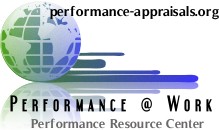What Is The Best Way To Get Managers To Do Employee Performance Appraisals?
There are actually two things that are important in getting managers to do employee performance appraisals, and human resource departments, who are often the ones who have to nag managers into submission, should be addressing both.
First, as we explained in our piece on WHY managers procrastinate, managers who don't understand how they, personally can benefit from doing the process properly, will simply tend not to do what they are asked to do. So, if the forms and procedures are less stressed, and the benefits of doing the process well ARE stressed, then there will be more commitment to the process. Often that means that managers can receive periodic training, or at least reminders of why they should be doing performance appraisals FROM THEIR PERSPECTIVE (that's the "what's in it for me" approach).
But what most important is that managers be held accountable for doing performance management and employee performance appraisals. Who should hold them accountable? In most organizations, human resource departments are responsible for the collection of forms, the documentation, and keeping track of whether the appraisal process is done. But they don't have the formal authority or power to actually hold managers accountable.
The key to manager accountability (and this applied to anything) is that the manager's immediate boss is the one that is responsible for holding the manager accountable. In other words, The VP of a division is responsible for and must hold his or her managers accountable for managing performance effectively, properly and in a timely way. The VP must include that manager's obligation as something set out in the manager's job responsibilities, and something that is discussed at each manager's own performance review.
It is the ONLY way to get managers going. That's not to say that, say, the VP, is responsible for beating managers into submission on the issue, since, like many performance situations, the manager (in this case the senior one) also has an educating role -- modelling and teaching how and why the performance needs to be managed.
